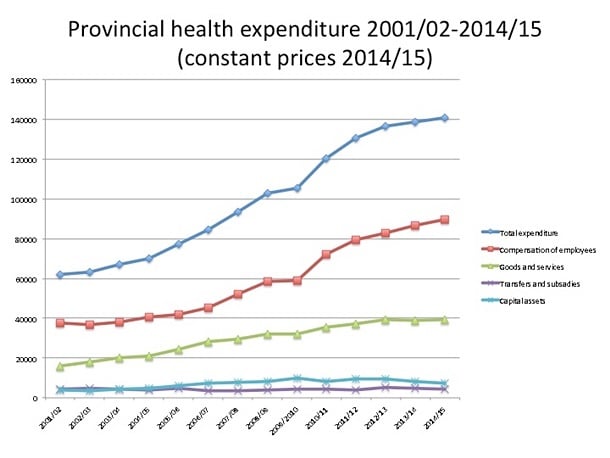
The National Department of Health has denied allegations that provincial health departments may be ‘freezing posts’ amid tight budgets.
“We want to put it on record that there are no medical posts frozen in this country,” said Health Minister Dr Aaron Motsoaledi in a statement. “If there is freezing of posts by government departments, they have nothing to do with medical doctors as posts in the health sector are exempted.”
Read: Left for dead: The shocking state of ambulances
“Anybody who knows a doctor who is unemployed due to ‘frozen posts’ must forward the name of such a doctor to me urgently and I will make sure that they are placed by the end of next week”, Motsoaledi added.
Motsoaledi’s statement follows media reports that as many as six provincial departments of health have institute formal or informal “moratoria” to prevent or strictly control the filling of posts, according to Rural Health Advocacy Project (RHAP) research.
Moratoria mean posts are essentially “frozen” - either officially via memos or unofficially. In the case of “unofficial moratoria,” some appointments are delayed so long – by for instance requiring permission from provincial treasuries or premiers – that candidates lose interest. Alternatively, positions are left vacant until they are eventually deleted from electronic human resource systems.
According to RHAP budget expert Daygan Eagar, alleged “moratoria” are aimed at cutting costs, driven largely by dramatic eight percent year-on-year salary increases on average for staff throughout the last decade. Provincial health budgets have grown by about two percent annually during the same period, according to Eagar
Read: Where are the ambulances? Where are the doctors?
In a recent Health-e News investigation, The Eastern Cape, KwaZulu-Natal and Free State did not confirm freezes but the Eastern Cape admitted to sending a circular in late 2015 stating only community service health workers with bursaries to pay back would be absorbed into the public health system due to budget constraints.
Graph caption: The rising share of health budgets spent on salaries as well as benefits is just one factor fuelling alleged budget shortfalls.
In KwaZulu-Natal and the Free State, either the Office of the Premier or, in the Free State, the Finance MEC must approve appointments as part of cost control measures. The Eastern Cape, KwaZulu-Natal and Free State health departments all said they were prioritising “critical” appointments but did not specify how that prioritisation was made.
Mpumalanga’s offices of the treasury and premier also “play an advisory role for all appointments across provincial departments,” but Premier David Mabuza has exempted health from hiring freezes placed on other departments. While the Western Cape decentralised hiring to local facilities to allow managers to ensure that the most critical posts are filled in line with available budget.
Read: Poor service also at private hospitals
Only the North West admitted having an official moratorium while the Northern Cape and Limpopo departments of health did not respond to requests for comment.
According to Eagar, provinces may have good reason to refrain from putting moratoria on paper.
“A few years ago, we called out the Eastern Cape for having a moratorium because they’d sent out a circular and it emerged that KwaZulu-Natal also had a moratorium on the appointment of staff they just didn’t call it that,” he added. “There’s good reason why provinces wouldn't want to name it.”
RHAP has welcomed the minister’s response. The advocacy organisation had originally called on national health and treasury departments to help guide provinces in protecting critical posts amid tight budgets. The body has stressed that “critical appointments” are not limited to medical professionals.
Read: Syndicates Taking Medical Schemes for Ride in South Africa
“A hospital without cleaners cannot deliver a safe service whilst the current tragic cuts in (rehabilitation) posts can lead to preventable permanent disability of the most vulnerable children in our country,” said RHAP in a statement alluding to the need for occupational therapists as part of rehabilitation services in many rural areas.
“Austerity measures, as they have been implemented to date, can lead to catastrophic consequences for health care, particularly for rural health settings,” said the advocacy group.
With employee compensation accounting for about 65 percent of provincial health spending, 2016/7 provincial health budgets face a R9-billion shortfall in money needed just to sustain salaries, according to Eagar’s budget analysis. – Health-e News.
Read more Health-e News articles on Health24
Lost patient cards make clinic queues even longer
Foetal alcohol syndrome is not just a Cape problem
SA doctors need not panic over 'certificates of need'




 Publications
Publications
 Partners
Partners











